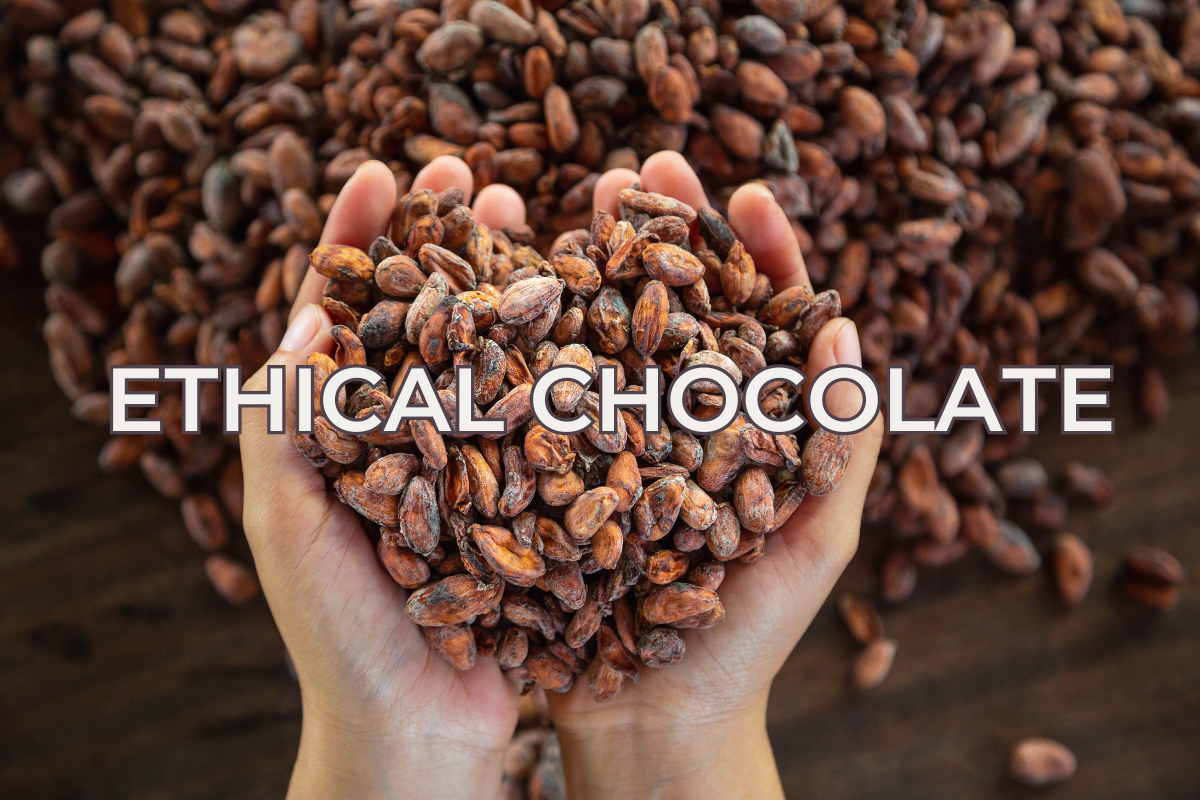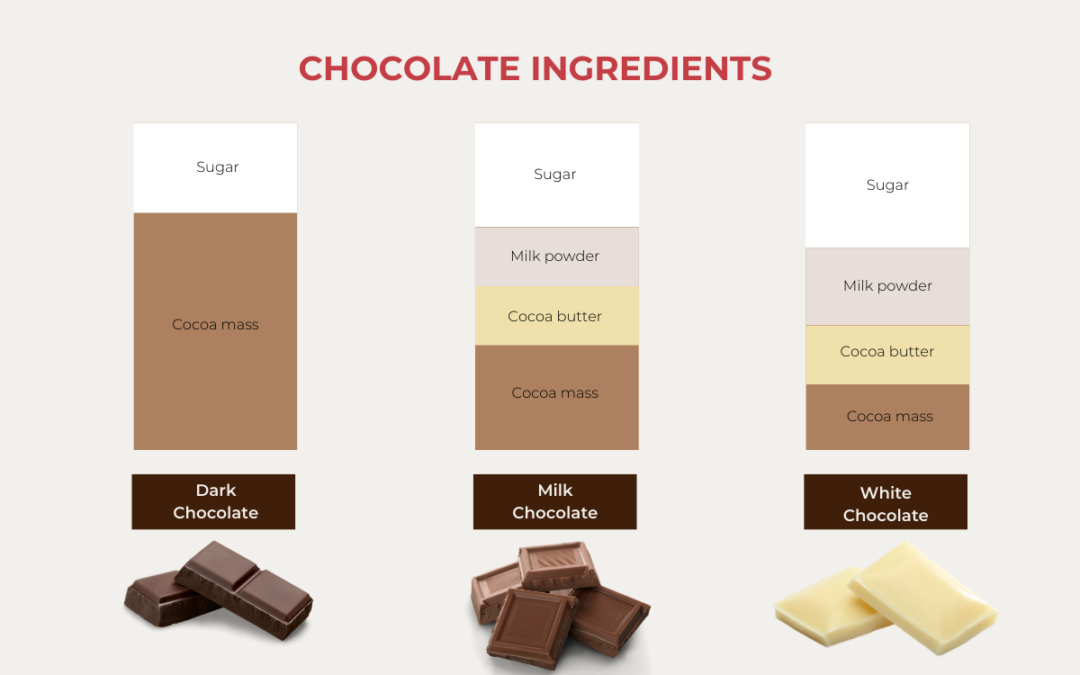In recent years, the demand for “ethical chocolate” has grown as more people become aware of the journey their favorite food takes from farm to shelf. Ethical chocolate goes beyond the basics such as organic farming practices—it considers the impact on people, communities, the local environment, and the planet. This approach to chocolate production focuses on sourcing ingredients in a way that respects farmers’ rights, protects ecosystems, and promotes fair wages and working conditions. In this article, we’ll explore what makes chocolate “ethical,” why it matters, and how choosing ethically sourced chocolate can support a more sustainable and responsible chocolate industry.
What is “ethical” chocolate?
Ethical chocolate is chocolate made with a commitment to fairness, sustainability, and responsibility. This means that the cocoa and other ingredients are sourced in a way that respects farmers’ rights, protects the environment, and follows fair labor practices. Ethical chocolate ensures farmers are paid fair wages, work in safe conditions, and are not subject to exploitative practices like child labor. It also promotes sustainable farming to protect ecosystems and reduce environmental impact. Overall, ethical chocolate aims to make a positive difference across the entire production supply chain, fostering a more responsible and fair chocolate industry.
Importance of ethical practices in chocolate production
Ethical practices in chocolate production are essential for creating a fair and sustainable industry. The chocolate supply chain often relies on small cocoa farms, where farmers face challenges like low wages, poor working conditions, and even child labor. About 90% of the world’s cocoa supply comes from smallholder farms. By supporting ethical practices, the industry can help ensure that cocoa farmers receive fair pay, have safe working conditions, and benefit from long-term economic stability. Additionally, ethical practices promote sustainable farming methods that protect the environment, reducing deforestation and conserving biodiversity in cocoa-growing regions. For consumers, choosing ethically produced chocolate means supporting brands that prioritize people and the planet, leading to positive change across the entire supply chain.
Some ethical considerations in cocoa farming
- Biodiversity: By preventing deforestation, it helps preserve rainforests, safeguard endangered species, and maintain vital carbon sinks. Supporting diverse planting also benefits pollinators like bees and butterflies, while protecting native flora and fauna to sustain a balanced, thriving environment.
- Water consumption: Practices like efficient drip irrigation, rainwater harvesting, and maintaining healthy soil help conserve water and reduce waste. By protecting water sources from pollution and considering local community needs, ethical farms ensure that cocoa production supports both the environment and those who depend on this vital resource.
- Organic farming practices: Organic cocoa farming prioritizes sustainability and environmental health by avoiding synthetic pesticides and fertilizers, protecting water sources, and enhancing soil health through natural methods like composting and crop rotation. These practices support biodiversity, promote safer working conditions, and reduce environmental impact, while meeting growing consumer demand for ethical, chemical-free chocolate. By balancing productivity with sustainability, organic farming ensures long-term benefits for farmers, ecosystems, and communities.
- Reduced carbon emissions: Ethical cocoa farming actively reduces carbon emissions by adopting sustainable practices such as agroforestry, which captures carbon through shade trees, and preventing deforestation to protect carbon sinks. Farms rely on renewable energy, efficient processing techniques, and organic methods to lower emissions from synthetic inputs. Additionally, improved soil management and sustainable transportation further minimize the environmental impact, making cocoa farming more climate-friendly and ensuring a sustainable future for the planet.
- Safe working conditions: Safe working conditions are essential in ethical cocoa farming. This includes protecting workers from harmful chemicals, ensuring fair wages, and offering proper safety gear and training. Ethical farms use organic practices, eliminate child labor, and comply with labor standards. They also provide access to healthcare and support workers’ rights, promoting a fair and sustainable industry.
- Child labor: Child labor is a significant issue in cocoa farming, particularly in developing countries. Ethical cocoa farming eliminates child labor by following international labor standards, investing in education programs, and ensuring fair wages for adult workers so their children can attend school. Certification programs like Fair Trade and Rainforest Alliance monitor compliance, helping to create a sustainable and humane cocoa industry.
- Slave labor: Slave labor is a critical issue in cocoa farming, but ethical practices focus on eliminating it by ensuring fair wages, workers’ rights, and adherence to international labor standards. Ethical farms empower workers to organize and are monitored through certifications like Fair Trade and Rainforest Alliance. These efforts promote safer, fairer conditions and reduce exploitation, fostering a more sustainable cocoa industry.
- Fair pay to workers: Fair pay is essential in cocoa farming, as many workers earn below the poverty line. Ethical farms prioritize living wages that cover basic needs, ensure transparent payment practices, and eliminate exploitative systems. They may also offer bonuses and support certifications like Fair Trade, which reinvest in communities. By ensuring fair pay, ethical cocoa farming improves workers’ lives and promotes a more equitable industry.
- Fair pay for cocoa: Fair pay for cocoa ensures farmers and workers are fairly compensated for their labor. Ethical cocoa farming promotes fair pricing, direct trade, and Fair Trade certifications that support community development. Long-term relationships with buyers and transparent payment practices help create stable incomes, reduce poverty, and build a more sustainable, ethical cocoa industry.
- Upcycling “waste” products: Upcycling cocoa waste, like cacao pulp and pods, is an ethical practice that promotes sustainability. These byproducts can be repurposed for products like juices or biodegradable packaging, creating extra income for farmers and reducing waste. By using the entire cocoa plant, ethical farming reduces pollution, supports local economies, and fosters a more sustainable, eco-friendly cocoa industry.
Environmental impact of ethical chocolate
Ethical chocolate production can even have a positive environmental impact, helping create a more sustainable future. Traditional cocoa farming can lead to deforestation, soil erosion, and biodiversity loss due to large areas being cleared for cocoa crops. In contrast, ethical chocolate brands use eco-friendly practices that protect natural habitats. They often support farmers in agroforestry, a method that mixes cocoa trees with other plants, which helps maintain soil health, prevents erosion, and provides shelter for wildlife.
Moreover, ethical chocolate is not just about farming practices; it spans all the way to the chocolate makers. Ethical producers aim to lower their carbon emissions and energy usage in factories, investing in renewable energy, sustainable packaging, and transparent sourcing. Consumers also play an important role. By choosing ethical chocolate, consumers help preserve ecosystems, reduce pollution, and support biodiversity, contributing to a healthier planet.
Reducing carbon footprint
Reducing the carbon footprint of chocolate production is crucial for lessening its environmental impact. From cocoa farming to transportation, every step contributes to greenhouse gas emissions. Ethical chocolate brands help offset these emissions by using sustainable practices, such as sourcing cocoa locally, utilizing renewable energy in production, and adopting eco-friendly packaging.
Supporting agroforestry, where cocoa trees grow alongside other plants, also plays a key role. This method not only improves soil health but also absorbs more carbon than traditional farming. By reducing their carbon footprint, ethical chocolate brands promote a more sustainable industry and contribute to a cleaner, greener planet.
Eco-friendly packaging
Eco-friendly packaging plays a key role in reducing the environmental impact of chocolate production. Traditional packaging, such as plastic and non-recyclable wrappers, contributes to pollution and landfill waste. As the demand for sustainable options grows, many ethical chocolate brands are switching to eco-friendly materials to lower their carbon footprint and encourage responsible consumption.Eco-friendly packaging
Packaging made from biodegradable wrappers, recyclable paper, or compostable materials helps cut down on waste, conserve resources, and reduce greenhouse gas emissions. It also typically requires less energy to produce and is made from renewable sources, further supporting sustainability.
By choosing chocolates with eco-friendly packaging, consumers can help reduce waste and support a circular economy. As more brands adopt these practices, the chocolate industry moves closer to a sustainable future, delivering delicious treats while protecting the planet.
Certification and standards
Cocoa certification ensures that cocoa has been produced according to certain ethical and sustainable standards set by certification organizations. These certifications help improve conditions for cocoa farmers, protect human rights, promote better farming practices, and reduce deforestation.
There are various certification systems, each with a unique focus. For example, Fair Trade Certified emphasizes creating fair trade relationships, while UTZ Certified and Rainforest Alliance focus more on increasing farmer productivity and sustainability. Generally, certifications aim to improve farmers’ livelihoods, promote responsible agriculture, and build local capacity.
It’s important to note that Fair Trade differs from other certifications because its main goal is to improve trade relationships and payment practices, rather than focusing on farming practices. Meanwhile, systems like UTZ and Rainforest Alliance prioritize sustainability and productivity to reduce risks for forest and farmers. Check out this article to dive deeper into the details of each certification.
Corporate Initiatives
There are various corporate initiatives that explain organizational practices, priorities, activities and impact. From big companies to small companies, annual reports are usually provided that are an excellent source for understanding the issues and consideration when choosing which chocolate to eat and which to avoid from an ethical standpoint. Here are a few examples of reports provided by chocolate brands, chocolate makers and cocoa importers:
- Nestle – Cocoa Plan
- Mondelez/Cadbury – Cocoa Life
- Mars – Cocoa for Generations / Cocoa and Forests Action Plan
- Hershey – Cocoa for Good
- Barry Callebaut – Cocoa Horizons
- Ferrero – People & Planet
- Uncommon Cacao – Transparency Report
- Tony’s Chocolonely – Sourcing Principles
Governmental regulations
The big chocolate companies can move slowly when it comes to ethical considerations in the chocolate supply chain. In order to make real change, some countries are using the power of government to enforce ethical practices in the cocoa supply chain. One example of this is the European Union Deforestation Regulation (EUDR). EUDR requires chocolate companies to ensure that the cocoa that they source doesn’t come from land that was illegally farmed (which usually involves destruction of native forest habitat). In this case, satellite imagery is being used to ensure that farmers haven’t encroached on protected forest land.
How to identify ethical chocolate?
First, it’s important to recognize that “ethical chocolate” can mean different things to different people. As a consumer, it’s important to understand the issues, and then buy chocolate that is in line with your ethical standards. To identify ethical chocolate, look for certifications such as Fair Trade, Rainforest Alliance, UTZ, and Organic, which ensure fair wages, sustainable sourcing, and environmentally responsible practices. Ethical chocolate often features high-quality, traceable cocoa with transparent supply chains. Researching a brand’s commitment to sustainability, fair labor, and eco-friendly packaging can also help confirm its ethical practices. Most chocolate companies provide annual reports on their websites related to ethical chocolate practices, so do your research. Additionally, make sure to choose chocolates that use recyclable or biodegradable packaging to further support sustainable practices.
In conclusion, buying ethical chocolate is more than just enjoying a sweet treat—it’s a way to support a fairer, more sustainable chocolate industry. By choosing ethical chocolate, you help ensure fair wages, better working conditions, and environmentally friendly farming practices. Supporting companies that are transparent about their sourcing and sustainability efforts makes a positive impact on the entire supply chain. As consumers, we can make a difference by choosing chocolate that promotes fairness, responsibility, and a healthier planet for everyone.
For more great articles and recipes, check out the rest of our CocoTerra blog.
If you have any questions or comments, feel free to contact us through our social media channels. We are @cocoterra_co on Instagram and Pinterest and @cocoterraco on X (aka Twitter) and Facebook.








